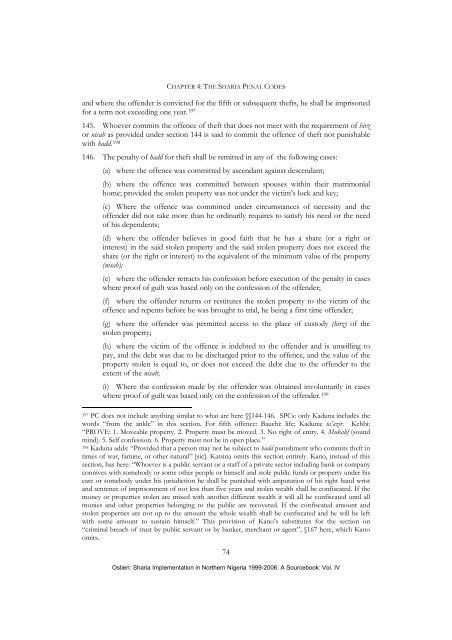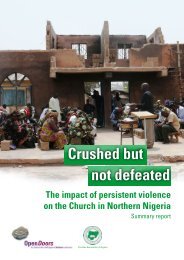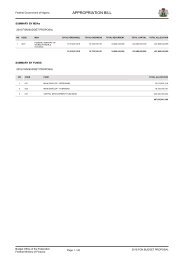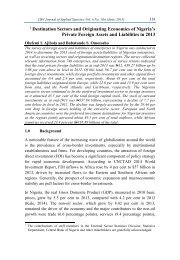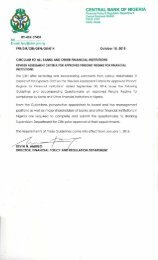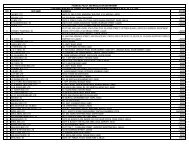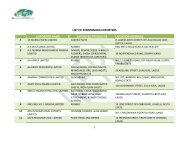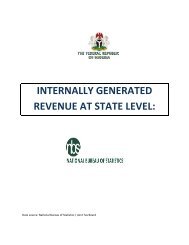vol_4_4_chapter_4_part_III
vol_4_4_chapter_4_part_III
vol_4_4_chapter_4_part_III
You also want an ePaper? Increase the reach of your titles
YUMPU automatically turns print PDFs into web optimized ePapers that Google loves.
CHAPTER 4: THE SHARIA PENAL CODES<br />
and where the offender is convicted for the fifth or subsequent thefts, he shall be imprisoned<br />
for a term not exceeding one year. 197<br />
145. Whoever commits the offence of theft that does not meet with the requirement of hirz<br />
or nisab as provided under section 144 is said to commit the offence of theft not punishable<br />
with hadd. 198<br />
146. The penalty of hadd for theft shall be remitted in any of the following cases:<br />
(a) where the offence was committed by ascendant against descendant;<br />
(b) where the offence was committed between spouses within their matrimonial<br />
home; provided the stolen property was not under the victim’s lock and key;<br />
(c) Where the offence was committed under circumstances of necessity and the<br />
offender did not take more than he ordinarily requires to satisfy his need or the need<br />
of his dependents;<br />
(d) where the offender believes in good faith that he has a share (or a right or<br />
interest) in the said stolen property and the said stolen property does not exceed the<br />
share (or the right or interest) to the equivalent of the minimum value of the property<br />
(nisab);<br />
(e) where the offender retracts his confession before execution of the penalty in cases<br />
where proof of guilt was based only on the confession of the offender;<br />
(f) where the offender returns or restitutes the stolen property to the victim of the<br />
offence and repents before he was brought to trial, he being a first time offender;<br />
(g) where the offender was permitted access to the place of custody (hirz) of the<br />
stolen property;<br />
(h) where the victim of the offence is indebted to the offender and is unwilling to<br />
pay, and the debt was due to be discharged prior to the offence, and the value of the<br />
property stolen is equal to, or does not exceed the debt due to the offender to the<br />
extent of the nisab;<br />
(i) Where the confession made by the offender was obtained in<strong>vol</strong>untarily in cases<br />
where proof of guilt was based only on the confession of the offender. 199<br />
197 PC does not include anything similar to what are here §§144-146. SPCs: only Kaduna includes the<br />
words “from the ankle” in this section. For fifth offence: Bauchi: life; Kaduna: ta’azir. Kebbi:<br />
“PROVE: 1. Moveable property. 2. Property must be moved. 3. No right of entry. 4. Mukalif (sound<br />
mind). 5. Self confession. 6. Property must not be in open place.”<br />
198 Kaduna adds: “Provided that a person may not be subject to hadd punishment who commits theft in<br />
times of war, famine, or other natural” [sic]. Katsina omits this section entirely. Kano, instead of this<br />
section, has here: “Whoever is a public servant or a staff of a private sector including bank or company<br />
connives with somebody or some other people or himself and stole public funds or property under his<br />
care or somebody under his jurisdiction he shall be punished with amputation of his right hand wrist<br />
and sentence of imprisonment of not less than five years and stolen wealth shall be confiscated. If the<br />
money or properties stolen are mixed with another different wealth it will all be confiscated until all<br />
monies and other properties belonging to the public are recovered. If the confiscated amount and<br />
stolen properties are not up to the amount the whole wealth shall be confiscated and he will be left<br />
with some amount to sustain himself.” This provision of Kano’s substitutes for the section on<br />
“criminal breach of trust by public servant or by banker, merchant or agent”, §167 here, which Kano<br />
omits.<br />
74


